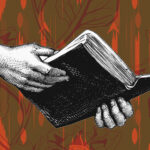Whenever I get speaking about books and reading, most people assume I was always a bookworm; that I was one of those kids forever snuggled up somewhere with their latest library withdrawal. Only I wasn’t. In fact, I often liken my love for reading to a kind of second conversion; indeed, this change in my life followed quite closely behind my actual conversion, aged 18. For I was quickly persuaded of the importance of books for the Christian life and growth. All these years later, I’m still a passionate advocate for reading and an avid reader. But along the way, I’ve made missteps, plenty of them. Below, I’ll limit myself to just 10 mistakes related to reading. I hope they will be of use.
1. Read Too Much
Reading isn’t as much about quantity as quality.
First up, my newfound convictions concerning reading led me to undiscerning consumption. To be fair to my youth pastors, it’s not that the books they suggested weren’t good; it’s that I was getting through too many books to benefit properly from each. At the risk of some eye-rolling, reading isn’t as much about quantity as quality. And by quality here, I’m not only referring to discernment but also reading well—more on that below. To quote an old post on this theme, in the words of the Greek philosopher Plato: “It is better to know one book intimately than a hundred superficially.”
2. Only Read One Book at a Time
In second place and to run the risk of being labelled self-contradicting, early on in my reading career, I didn’t take advantage of having multiple books on the go, simultaneously. Let me explain.
I think it’s a mistake to only read one book at a time.
Today, on my bedside table typically sits a stack of books. In part, they’re there to irritate my wife; on the other hand, physical books are beautiful, an aesthetic I never grow tired of, however untidy. But the real reason for that book tower is that I think it’s a mistake to only read one book at a time. Personally, I’m most alert and able to digest more demanding reads in the morning. But in the evening, I usually take up my novel or something lighter. If I have a gap during the day, I’ll read something made up of smaller, more easily digestible parts, which doesn’t require sustained time. Furthermore, my mood will often determine what I feel like reading. If you only have one book on your bedside, you’ll either end up reading it under duress or become distracted by something else and put it down.
3. Didn’t Compound My Reading
Linked with the previous mistake, by reading related books over the same period of time or sequentially, you can earn a kind of compound interest on your reading. For example, this week I’m preparing to give a talk on the German philosopher Friedrich Nietzsche; so over the past couple of weeks I’ve read some of his primary works, secondary sources on his philosophy, and a biography. Whatever your own interests or desired areas of learning, this approach to reading has served me well—one can even add podcasts or YouTube videos into the mix.
My reading was often too scattered and disjointed.
Sadly, when I look over the books I’ve read over the years, there are many that I learned very little from. This is in part because my reading was often too scattered and disjointed. Below, I’ll make a case for reading broadly, but here I’m referring to reading deeply. If you want to understand, for example, the theology of Augustine, you should read Confessions or City of God, naturally. But that reading will only be enriched by turning to other books, whether theological introductions or intellectual biographies.
4. Thought I Had to Finish Books
There are many books I shouldn’t have finished. Fact. Admittedly, this isn’t always easy to know at the time. Added to that, and this is especially true of fiction, there’s always the hope that a poor book will turn the proverbial corner. Sometimes they do. But more often than not, they don’t. Some books simply aren’t worth the investment of your time or attention. You don’t owe mediocre books anything.
You don’t owe mediocre books anything.
In making this point, I realise there’s a delicate balance. Not all of your reading should be of the effortless, coasting kind. Sometimes you will have to push through a book because you’re convinced it will be fruitful in the long term. But I would caution against going about the majority of your reading in this manner. It will sap the joy from your reading and make you less inclined to choose it when faced with other options, particularly the ease of internet streaming.
On this point, I’d add that there is such a thing as the right book at the wrong time. So put it down and pick it up later.
5. Too Focused on Newer Books
There are many tried and tested books. Good marketing guarantees nothing; hype is often misplaced; and trends are typically short-lived. All of this means that there is wisdom in taking up newer books slowly, while deferring to those that have been recognised over the centuries. John Calvin’s Institutes aren’t a mainstay in the Reformed tradition by chance. Countless believers have found that work a tremendous blessing. So if you want to add a systematic theology to your shelves, that’s a good start.
There’s wisdom in taking up those books that have been recognised over the centuries.
This is an important point in our day and age, one obsessed with the latest and shiniest, the trendy and BookTok. I’m not suggesting that you should only read books published before the 21st century; instead I’m trying to correct the notion that nothing was published before then. On many occasions, I’ve said something along the lines of, ‘the vast majority of the best books you’ll ever read already exist.’ Go find them. Don’t be blinded by the modern lights.
6. Didn’t Reread Books
Here is an important corollary to my first point. Because reading isn’t about volume, you can afford to reread books. In fact, you can’t afford not to. Apparently, C. S. Lewis wrote, “An unliterary man may be defined as one who reads books once only.” He went on to explain that “we do not enjoy a story fully at the first reading.” Building on that, we simply don’t gain as much as we could from a book by only reading it once. An argument could be made that your return on investment with reading is exponential. That’s certainly been my experience.
We simply don’t gain as much as we could from a book by only reading it once.
As a believer of just a few years, I was given D. A. Carson’s Call to Spiritual Reformation, now Praying With Paul. I undoubtedly benefitted from reading it then, but I can honestly say that rereading it last year—for the third or fourth time—was even more enriching. Things I vaguely remembered were solidified, and new insights were gleaned. Furthermore, I’m older and (hopefully) more mature; therefore, as a reader, I bring more to the work than I did previously. Make a practice of returning to books that impacted you, and read them again.
7. Read Too Narrowly
Following hotly on the heels of my conversion—and subsequent conversion to reading—I started adding Bible commentaries and popular level theology to my tragically bare shelves. But it would take me years to come around to other kinds of books, such as history, philosophy, social commentary and fiction. Now, please don’t hear me undoing previous points. You should read deeply and also commit to the practice of rereading. But you should also aim for variety in your literary diet.
Aim for variety in your literary diet.
Naturally, it’s easier and therefore advisable to start where you’re most drawn and interested. These days, I find it much easier to pick up a novel than, say, history or even a work of theology. Therefore, I must deliberately ensure that I’m reading broadly, outside of my instincts. Don’t get to the end of a calendar year and have nothing to show for it, apart from thousands of pages of fantasy—or philosophy, for that matter. Reading contains wonderful avenues for learning and thinking. Try not to get stuck on just one of them.
8. Thought Big Works Were Unattainable
We often avoid larger books because we’ve all experienced the discouragement that slow progress brings. One of the best solutions to this is plotting your reading of larger works over a long period of time. Take the long view. Read books bit by bit, slowly and steadily. Instead of trying to power through Calvin’s Institutes in a couple of months, plan to read it over the course of a year by reading for just 10 minutes a day. That’s right, 10 minutes. John Piper describes these as “disciplined blocks,” and many can testify to the benefits of working deliberately through larger works over a longer period.
9. Undervalued Stories and Fiction
I’ve already alluded to the riches of story, above. Sadly, I wasn’t always convinced. Perhaps it was a hangover from my schooling, where it was drummed into us: non-fiction is about facts and truth, but fiction is just made up. Thankfully, this is no longer my outlook. In fact, with the help of C. S. Lewis, I’ve argued that “fiction is a deep well, from which we can draw much truth.”
Learning isn’t limited to information. Fiction helps us to feel the truth.
Too often, people associate fiction with recreation and non-fiction with value-adding reading. This is a misnomer. Learning isn’t limited to information. Formation isn’t only achieved through propositions. Fiction helps us to feel the truth. And, as D. A. Carson argues, by gaining a feel for this kind of literature, we become better readers of others, even the biblical text.
10. Didn’t Read With Others
Finally, I didn’t always know that some of your best reading will take place in community. It’s a little ironic, if you think about it. Christians are typically insistent about reading the Bible together, in small groups or 1-2-1s. Yet when it comes to the rest of our reading, we tend to do it alone. Why?
Reading in community has been a wonderful blessing to me in recent years. In some format or other, I’ve read novels, technical theology, sociology, and philosophy with others who are eager to learn. And it’s always been delightfully beneficial to hear what others thought and to think through the meaning or implications with them. In the Western world, reading has increasingly become an isolated exercise when it is best enjoyed with others.














